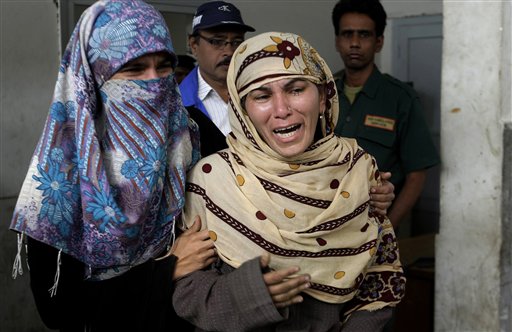PESHAWAR, Pakistan — Three workers in a polio eradication campaign were shot in Pakistan on Wednesday, and two of them were killed, the latest in an unprecedented string of attacks over the past three days that has partially halted the U.N.-backed campaign.
The United Nations in Pakistan has pulled all staff involved in the immunization campaign off the streets, spokesman Michael Coleman said.
The government insisted immunization was continuing in some areas although many Pakistani health workers were refusing to go out.
Government officials were surprised by the violence, saying they had not expected attacks in areas far from the Taliban’s strongholds and they would have to change tactics in the health campaign.
“We didn’t expect such attacks in Karachi,” said Mustafa Nawaz Khokhar, minister for human rights, who oversees the polio campaign. He was referring to the southern commercial hub where there have been attacks this week.
“In far flung areas where the threats are more pronounced, we have been providing polio teams security.”
Wednesday saw four separate attacks. In the northwestern district of Charsadda, men on motorbikes shot dead a woman and her driver, police and health officials said.
Hours earlier, a male health worker was shot and badly wounded in the nearby provincial capital of Peshawar. He was in critical condition, said a doctor at the Lady Reading Hospital where he is being treated.
Four other women health workers were shot at but not hit in nearby Nowshera, said Jan Baz Afridi, deputy head of the Expanded Programme on Immunisation. Two women health workers were shot at in Dwasaro village in Charsadda, police said.
It was not clear who was behind the violence.
Many Islamists, including Taliban militants, have long opposed the campaign. Some say it aims to sterilize Muslims, while one militant commander said it could not continue unless attacks by U.S. drone aircraft stopped.
The Taliban have repeatedly threatened health workers involved in the campaign. Some workers said they received calls telling them to stop working with the “infidels” just before the attacks.
But a spokesman for the Pakistani Taliban, Ihsanullah Ihsan, told Reuters his group was not involved in the violence.
“BETTER COORDINATION”
On Monday and Tuesday, six health workers were killed in attacks in the southern port city of Karachi and in Peshawar. Five were women and the youngest was 17.
Five of the shootings happened in Karachi, home to 18 million people. Health authorities there suspended the polio eradication campaign in the entire province of Sindh.
Imran Shaukat, spokesman for Karachi police, said the teams were supposed to inform police about their movements but had not done so.
“There has to be better coordination between the health department and police,” he said. “We have decided that we will be more forthcoming and contact polio team heads ourselves.”
Minister Khokhar said the drive would resume as soon as security was in place.
“The teams go into every little neighborhood. You can understand that enormous resources are needed if we have to protect each and every team and worker, which we will have to now,” he said.
Authorities in Khyber Paktunkhwa province, where the capital is Peshawar, said they would not accept the U.N.’s recommendation to suspend the campaign.
“Halting the campaign at this stage would create more problems as it’s not a one-day phenomenon. If we stopped the campaign it would encourage the forces opposing the polio vaccination,” said provincial official Javed Marwat.
Khokar said Taliban hostility to the campaign increased after it emerged that the CIA had used a fake vaccination campaign to try to gather information about Osama bin Laden, before he was found and killed in a Pakistani town last year.
Pakistan had 20,000 polio cases in 1994 but vigorous vaccination efforts had brought the number down to 56 in 2012, the government said.
A global vaccination campaign has eradicated the disease from everywhere except Pakistan, Afghanistan and Nigeria.
Polio can paralyze or kill within hours of infection. It is transmitted person-to-person, meaning that as long as one child is infected, the disease can be passed to others.
(Additional reporting by Mehreen Zahra-Malik; Writing by Katharine Houreld; Editing by Michael Perry and Robert Birsel)
Send questions/comments to the editors.


